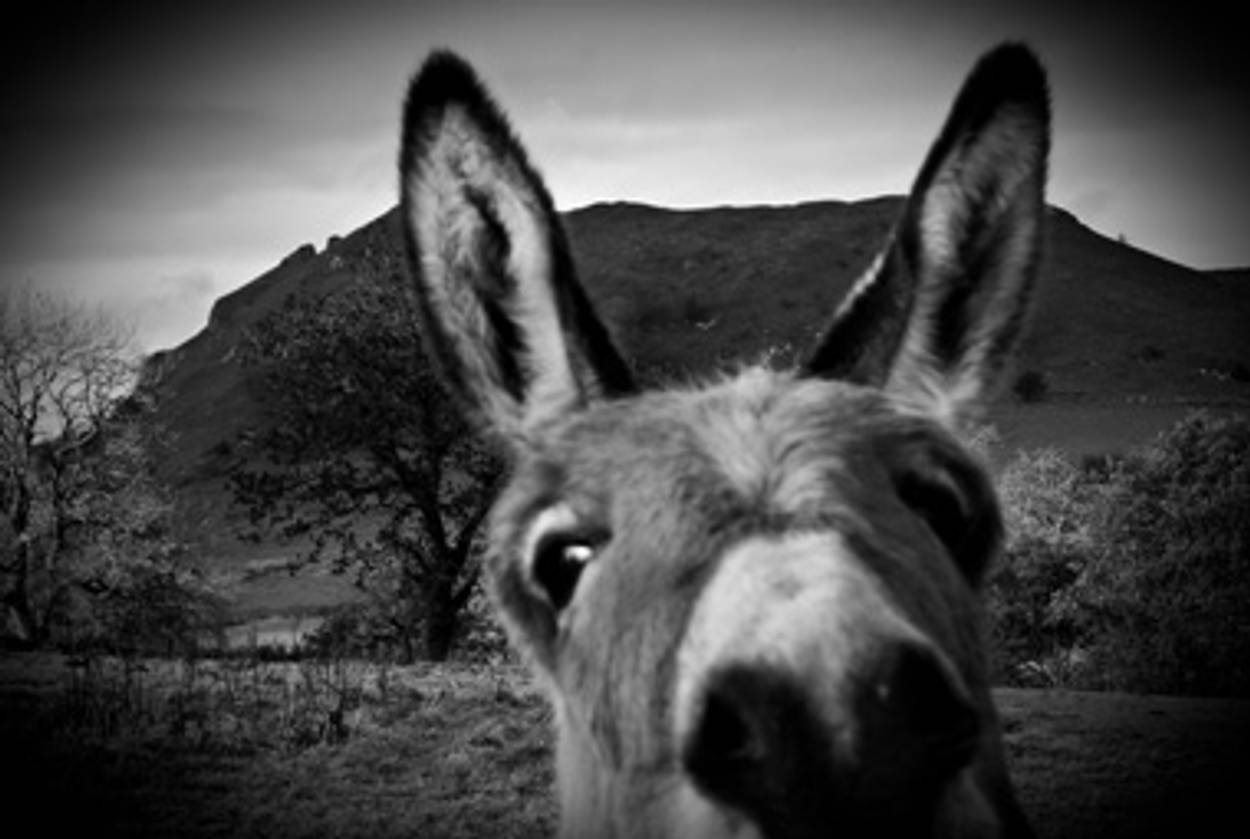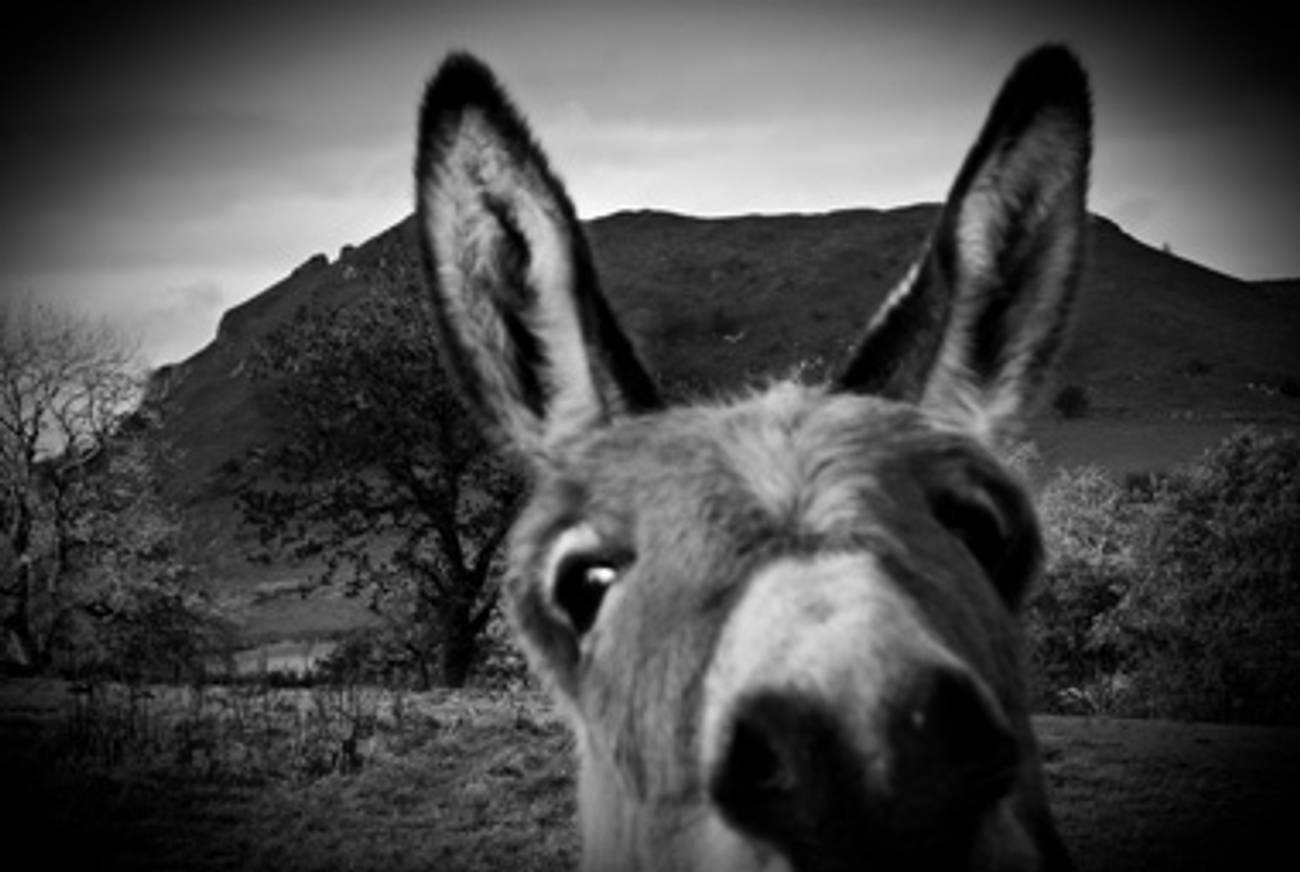Animal Style
For spiritual guidance, just ask an assNumbers 19:1-25:9




Summer is here! How do I know? Because anthropomorphic animals are upon us.
This week, Fox Studios are releasing the third installment in the popular “Ice Age” franchise, this one titled Dawn of the Dinosaurs. So desperate were the besuited dudes at Fox to squeeze a few more sizable piles of cash out of the adventures of a woolly mammoth, a saber-toothed tiger and a ground sloth, that they happily hatched a plot to introduce a clan of subterranean dinosaurs for the otherwise glacial gang to befriend, throwing in at least two or three additional funky, furry sidekicks for good measure.
Never ones to be out-cuted by the competition, Walt Disney Studios will introduce their own anthropomorphic adventure later this month. Entitled G-Force, the film follows a team of highly trained, fully armed guinea pigs serving as secret agents of the United States government. Their leader is named Darwin. I’m not making any of this stuff up.
But studio executives, always on the lookout for inspiration (how else to explain the fact that two of the summer’s biggest movies are based on children’s toys from the 1980s?), would do well to crack open their Bibles. This week, the Good Book gives us the mother of all animated animals, a talking she-donkey who’s got mad spiritual skills.
The asinine heroine, it should be noted, is the second of only two talking animals in the Bible. If the previous chatty beast—a highly convincing serpent with a penchant for apples—is any example, when the scripture puts words in the mouths of the usually speechless, we better listen.
The she-donkey, to be sure, doesn’t deliver anything nearly as dramatic and disastrous as her slithering predecessor. But her message is one that we all, not just harried studio execs, would be wise to heed.
As the eventful parasha unfurls, the Israelites, every day getting closer to the Promised Land, meet with resistance from the local peoples whose territories they must traverse en route to redemption. God, of course, delivers, and pretty soon both the Amorites and the Bashanites are felled. Which, as you may imagine, makes the Moabites, the next in line on the Chosen People’s warpath, a tad nervous. Realizing that he could not best God’s people, Balak, their shrewd king, decides to fight holy with holy, and sends emissaries to summon Balaam, a prophet of sorts, to cast his spells in Moab’s aide.
At first, Balaam refuses to go with Balak’s men. He can only do, he says, as the Lord commands him. But the Lord, in a sporting mood, pops up in a dream and tells Balaam to go with the emissaries. Balaam sets out to do just that, but God, for some inexplicable reason, changes his mind and sends an angel to prevent Balaam from reaching his destination. Just to make things more interesting, God makes sure His cherub is invisible.
And so, riding his favorite she-donkey—the one, we’re told, he’s had his entire life—Balaam trots up the road to meet Balak. But the donkey, being the only one who sees the menacing angel, refuses to proceed and runs off to a nearby field. Her master, impatient, beats her up, forcing her back on the path. But the angel is still there, and the beast is still spooked, so she bucks and presses her master’s leg against a nearby fence. Balaam, annoyed, thrashes her again, and again drags her back to the road. But the donkey, as is the way of her species, does not relent; she lodges herself in a narrow nook, making Balaam so furious that he beats her vigorously, this time with a stick. And then, for the second and last time in the Bible, the Lord bestows on an animal the gift of speech.
And what a speech the poor donkey delivers! It’s doubtful that most of Hollywood’s contemporary screenwriters could come up with such touching lines for a human actor, let alone one with long ears and a rough coat.
“What have I done to you that you have struck me these three times?” she asks. “Am I not your she-donkey on which you have ridden since you first started until now? Have I been accustomed to do this to you?”
Balaam, ashamed, concedes the point. And, just then, God opens the Moabite prophet’s eyes, and the newly visible angel speaks to Balaam angrily.
“When the she-donkey saw me,” says the seraph, “it turned aside these three times. Had she not turned aside before me, now also I would also have killed you and spared her.”
The story, like most summer movies and Biblical tales involving God’s will, has a happy ending: Balaam confronts Balak, and instead of cursing the Israelites he blesses them. But it’s in the words of the talking donkey that contemporary readers might find some fascinating morsels of meaning.
Unlike Hollywood’s animals, who are constantly given permission to speak but who rarely deliver more than shtick and schlock, Balaam’s donkey’s plea is touching and timeless. As soon as she can talk, she doesn’t say, “Hey, quit yer’ beating!” or “Look out! There’s an angry angel about to kill you!” She speaks softly. She is hurt. She wants to know why her master, to whom she’d been nothing but faithful, is being so cruel.
Those of us who have pets will have no trouble recognizing this plaintive tone. We detect it in the eyes of our dogs and cats, often for committing far less grievous transgressions against them such as failing to share our hamburger with Fluffy or leaving Whiskers home alone for many long hours.
Even if, unlike me, you stir clear clear of that primal Hollywoodian sin of assigning to animals human qualities they probably do not possess—as much as I’d like to believe otherwise, my floppy-eared mutt, Molly, probably doesn’t spend her days contemplating malicious little retributions and thinking up new, inventive ways to be bad—Balaam’s donkey nonetheless provides a very convincing argument for animal consciousness. Animal magic, even: the donkey sees God’s angel when her owner remains blind.
If we seek to learn anything from animals, then, let us ignore the belligerent guinea pigs and hilarious sloths and listen to this biblical donkey instead. Let us believe that animals, like us, are God’s creatures, and that, like us, they are not without their spiritual stirrings. And let us do whatever we can to speak on their behalf. Myself, I support several animal rights organizations, including Safe Haven For Donkeys in the Holy Land—which saves battered brayers, a particularly brutalized animal in Israel and the Palestinian Territories—and the ASPCA. You, of course, could choose other organizations. But I hope that this weekend, instead of simply relaxing at the multiplex, you listen to the beasts, look heavenward, and see the angel.
Liel Leibovitz is a senior writer for Tablet Magazine and a host of the Unorthodox podcast.
Liel Leibovitz is editor-at-large for Tablet Magazine and a host of its weekly culture podcast Unorthodox and daily Talmud podcast Take One. He is the editor of Zionism: The Tablet Guide.